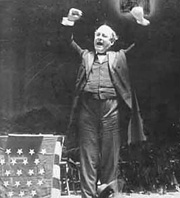The First Sound Bite
Ochen Kaylan
OCTOBER 11, 2008
- Fiery orator William Jennings Bryan.
- (Library of Congress)
- Enlarge This Image
Related Stories
- Foreclosure Double Punch
- The End of Weekend America
- Conversations with America: Concluding the Conversation
- Good News, Bad News, No News
Extra Audio
- William H. Taft on Government's Intrusion Into Business.
- William Jennings Bryan on Campaign Finance Reform
More From Ochen Kaylan
We seem to have gotten used to the idea that political campaigns are just strings of sound bites for months on end. And it seems like it's always been that way. But, of course, it hasn't. We don't imagine George Washington giving 10-second prefab answers to reporters. So when did political sound bites actually start showing up? Well, many historians say it happened exactly 100 years ago. Producer Ochen Kaylan takes us back to the presidential election of 1908.
---
The 1908 campaign came down to two final candidates: Democrat William Jennings Bryan and Republican William H Taft.
Before the 1900s, it was considered unseemly for a presidential candidate to campaign for themselves, so others would do it for them - party officials or running mates. Even actors traveled around the country performing a candidate's speeches.
But in 1896, William Jennings Bryan changed the game when he hopped on a railway car and gave his own speeches, reportedly, to millions of people, something unheard of at the time.
He lost that election, but 12 years later when Bryan ran for a third time, there was this new, kooky thing popping up in people's houses - a phonograph. It wasn't actually new. Phonographs had been around for about 30 years, but they were only now cheap enough, and actually safe enough, so that regular people could own one.
The Edison company approached Bryan and asked to record some of his campaign speeches. But there was one problem - the wax cylinders could only hold a few minutes of sound. Political speeches were rambling lectures that could go hours.
But Bryan was a gifted orator and didn't see a problem. He'd just distill a single idea down to two minutes. One cylinder - one idea - just the highlights.
"An election is a public affair," said Bryan in a recording on campaign finance reform. "There is no sound reason for secrecy in regard to campaign methods, and publicity, in itself, will prove a purifying influence in politics."
But the press hammered Bryan as a blowhard who just loved the sound of his own voice. His campaign was humiliated until the public got a hold of the recordings. People loved them.
Taft somewhat begrudgingly agreed to record a few cylinders of his own. Here, he tells government to get out of business.
"The combination of capital in large plants and manufactured goods in the greatest economy, is just as necessary as the assembling of the parts of the machine to the economical and more rapid manufacturing of what, in old times, was made by hand. The government should not interfere with one any more than the other � for they are then the natural result of modern enterprise and are beneficial to the public."
People around the country held listening parties where they'd play a few cylinders from each candidate. A few entrepreneurs set up mannequins of the candidates and alternated cylinders, in a sort of surreal mock-debate.
But more importantly, everyday citizens brought the ideas of the candidates into their homes. People wanted an eloquent summation of the stance they support on the issues they care about - banking regulation, or civil rights, or national security. The sound bite was born, and the audience loved it.
William Jennings Bryan lost that election, too. But President Taft's recordings came back to haunt him when he was up for reelection. Turns out it's a little too hard to ignore broken campaign promises when everyone has a recording of you making them.







Comments
Comment | Refresh
Post a Comment: Please be civil, brief and relevant.
Email addresses are never displayed, but they are required to confirm your comments. All comments are moderated. Weekend America reserves the right to edit any comments on this site and to read them on the air if they are extra-interesting. Please read the Comment Guidelines before posting.
You must be 13 or over to submit information to American Public Media. The information entered into this form will not be used to send unsolicited email and will not be sold to a third party. For more information see Terms and Conditions and Privacy Policy.